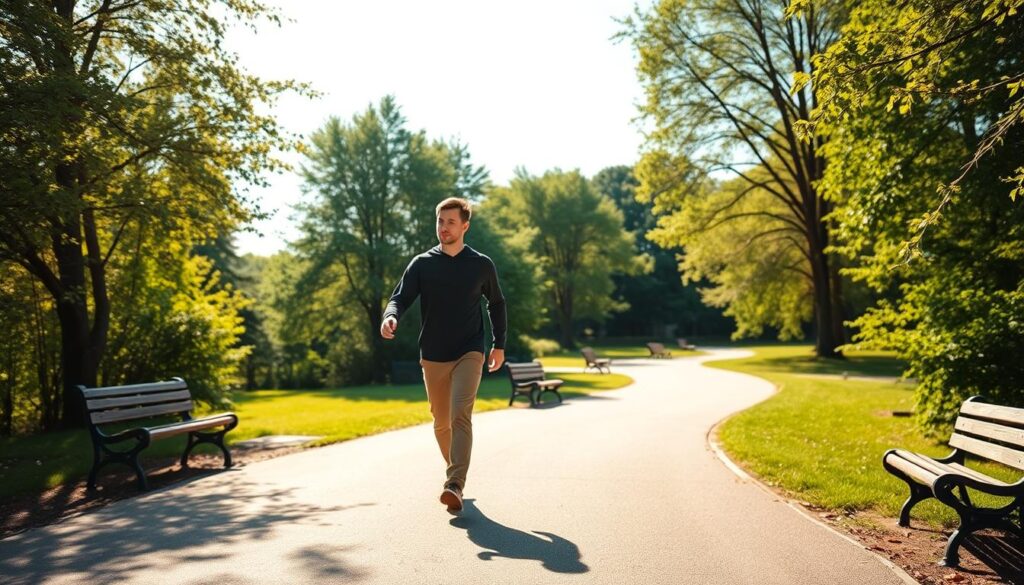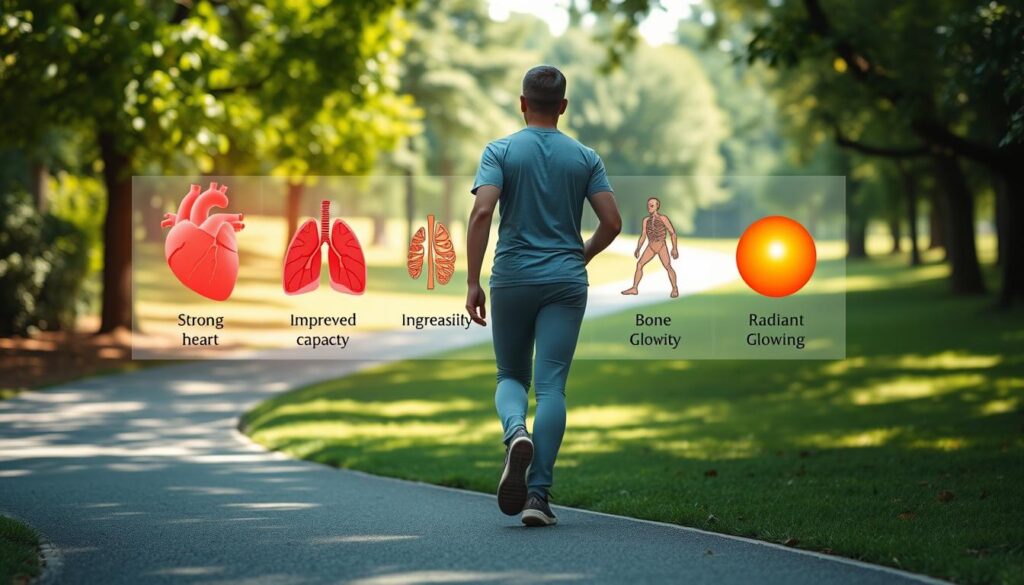30 Minutes a Day: Transform Your Health with Walking
Imagine transforming your health with a simple, yet powerful habit: walking. Incorporating a daily walking routine can have a profound impact on your overall well-being, serving as a natural and holistic approach to detoxification and health improvement.
By dedicating just a short period each day to walking, you can experience significant benefits. This habit not only enhances your physical health but also contributes to mental clarity and emotional balance, making it a comprehensive approach to improving your health.
Key Takeaways
- Transform your health with a simple daily walking routine.
- Walking is a natural method for holistic detoxification.
- A daily 30-minute walk can significantly improve overall health.
- Incorporating walking into your daily routine enhances physical and mental well-being.
- A consistent walking habit contributes to long-term health benefits.
The Power of a Daily 30-Minute Walk
A daily 30-minute walk is a simple yet powerful habit that can transform your health. By incorporating this habit into your daily routine, you can experience significant improvements in your overall wellbeing.
A Simple Habit with Profound Effects
Walking daily for 30 minutes can have profound effects on your health. It’s a natural detoxification method that helps cleanse your body and improve your mental clarity. Regular walking can also boost your energy levels and enhance your mood.
The benefits of this simple habit are numerous. It can help you maintain a healthy weight, improve your cardiovascular health, and even reduce stress and anxiety. By making walking a daily habit, you’re taking a significant step towards a healthier lifestyle.
Accessibility: Walking for Everyone
One of the most significant advantages of walking is its accessibility. Regardless of your age or fitness level, you can incorporate a daily 30-minute walk into your routine. Whether you prefer walking in the morning, during your lunch break, or in the evening, there’s a time that suits everyone.
To illustrate the accessibility and benefits of walking, consider the following table:
| Benefits | Description |
|---|---|
| Improves Cardiovascular Health | Regular walking strengthens your heart and improves circulation. |
| Supports Weight Management | Walking daily can help burn calories and maintain a healthy weight. |
| Enhances Mental Health | Walking reduces stress and anxiety, improving overall mental wellbeing. |
Why Walking 30 Minutes a Day Can Change Your Health
Incorporating a daily 30-minute walk into your routine can have a profound impact on your overall health. By making this simple habit a part of your daily life, you can unlock numerous benefits that enhance your wellbeing. Walking is not just a form of exercise; it’s a powerful tool for transforming your health.

The Science Behind Walking’s Health Benefits
Research has shown that walking can have a significant impact on both physical and mental health. The science behind walking reveals that it can help reduce the risk of chronic diseases, improve cardiovascular health, and boost mood. When you walk, you’re not just moving your body; you’re also improving your overall health.
Some of the key health benefits of walking include:
- Improved cardiovascular health
- Weight management
- Enhanced mental wellbeing
- Increased energy levels
These benefits are a result of the consistent effort you put into walking daily.
How Consistency Creates Transformation
Consistency is key when it comes to walking for health benefits. By committing to a daily 30-minute walk, you can create a transformation in your health. This consistency helps to improve cardiovascular health, boost your mood, and increase your energy levels. Over time, these small changes can add up to significant health transformations.
To achieve these transformations, it’s essential to make walking a habit. Here are some tips to help you stay consistent:
- Schedule your walks at the same time every day
- Find a walking buddy or join a walking group
- Track your progress using a pedometer or fitness app
By following these tips and maintaining a consistent walking routine, you can unlock the full potential of walking for your health.
Physical Benefits: What Happens to Your Body
The physical benefits of walking 30 minutes a day are numerous and can transform your body in meaningful ways. Regular walking can lead to significant improvements in your overall health, and it’s easier to incorporate into your daily routine than you might think.
Cardiovascular Improvements
Walking 30 minutes a day can lead to significant cardiovascular improvements. Regular walking helps lower blood pressure, improve circulation, and increase overall heart health. By incorporating a daily walk into your routine, you can reduce your risk of heart disease and stroke.
Weight Management and Metabolism
A daily 30-minute walk can also aid in weight management and boost your metabolism. Walking helps burn calories and build muscle, which can lead to a more efficient metabolism. Additionally, regular walking can help regulate appetite and support a healthy diet.
- Burn calories and aid in weight loss
- Build muscle and boost metabolism
- Regulate appetite and support a healthy diet
Muscle and Bone Strength
Walking is a weight-bearing exercise that can help improve muscle and bone strength. Regular walking can lead to stronger bones and muscles, particularly in the legs and hips. This can reduce the risk of osteoporosis and fractures, especially in older adults.
Immune System Enhancement
A daily 30-minute walk can also enhance your immune system. Walking helps stimulate the immune system, which can lead to a reduced risk of illness and infection. Additionally, regular walking can help reduce stress and promote overall well-being.
Incorporating a daily 30-minute walk into your routine can have a significant impact on your physical health. By combining walking with other healthy habits, such as a balanced diet and proper hydration, you can experience even greater benefits. For example, you can support your body’s natural detoxification processes by drinking plenty of water and eating a diet rich in fruits and vegetables, which can be considered as part of dicas de desintoxicação em casa or home detoxification tips.
Mental Health Advantages of Daily Walking
You can experience significant mental health improvements by committing to a daily 30-minute walk. Walking is a simple, accessible activity that offers numerous benefits for your mental wellbeing, from reducing stress and enhancing mood to improving cognitive function and sleep quality.

Stress Reduction and Mood Enhancement
Walking daily can significantly reduce stress levels by releasing endorphins, also known as “feel-good” hormones. These natural chemicals help alleviate symptoms of anxiety and depression, promoting a better mood. Regular walking can also enhance your overall sense of wellbeing, making it easier to manage daily stressors.
Key benefits of walking for stress reduction include:
- Lower cortisol levels
- Improved mood stability
- Enhanced resilience to stress
Cognitive Benefits and Brain Health
Regular walking not only benefits your physical health but also supports cognitive function. It improves blood flow to the brain, boosting memory, concentration, and creativity. Studies have shown that walking can even help prevent cognitive decline in older adults.
| Cognitive Benefit | Description |
|---|---|
| Improved Memory | Enhanced ability to recall information |
| Better Concentration | Increased focus and attention span |
| Boosted Creativity | Enhanced problem-solving skills |
Sleep Quality Improvement
Walking daily can also improve sleep quality by regulating your body’s internal clock and reducing stress. Better sleep is essential for overall mental health, as it allows your brain to rest and recover. Establishing a consistent walking routine can help you fall asleep faster and enjoy deeper, more restorative sleep.
By incorporating holistic detoxification techniques, such as deep breathing and mindfulness during your walks, you can further enhance the mental health benefits. This integrated approach can lead to a more balanced and healthy lifestyle.
Long-Term Health Outcomes of Regular Walking
By committing to a daily walking habit, you can experience significant improvements in your long-term health. Regular walking is a natural way to cleanse your body and enhance your overall wellbeing. As you continue this habit, you’ll start to notice the positive effects on your health.

Reduced Risk of Chronic Diseases
Walking regularly can help reduce the risk of chronic diseases, such as heart disease, type 2 diabetes, and certain types of cancer. This is because walking helps to improve cardiovascular health, regulate blood sugar levels, and boost the immune system. By incorporating a daily 30-minute walk into your routine, you can take a proactive approach to preventing these conditions.
Longevity and Quality of Life
In addition to reducing the risk of chronic diseases, regular walking can also contribute to increased longevity and a better quality of life. Walking helps to maintain physical function, reduce the risk of falls, and improve mental health, all of which are essential for healthy aging. By making walking a habit, you can enjoy a more active, independent, and fulfilling life as you age.
As you can see, incorporating a daily walking habit into your routine can have a profound impact on your long-term health outcomes. By reducing the risk of chronic diseases and improving longevity and quality of life, walking can be a simple yet effective way to enhance your overall wellbeing.
Getting Started: Creating Your 30-Minute Walking Routine
To kick-start your journey to better health, creating a consistent walking routine is essential. Establishing a daily habit of walking can seem daunting, but with a few simple steps, you can make it a sustainable part of your lifestyle.
Finding the Right Time in Your Day
Identifying the best time to walk is crucial. Consider your daily schedule and choose a time that works consistently. Many find that walking in the morning helps kick-start their day, while others prefer it as a stress-relieving activity after work. Consistency is key, so pick a time that you can commit to daily.
Proper Walking Form and Technique
Maintaining proper walking form is vital to maximize the benefits and minimize the risk of injury. Keep your head up, shoulders relaxed, and engage your core. Your feet should strike the ground midfoot or heel-first, rolling through to the toes. Good posture enhances the effectiveness of your walk and reduces strain on your body.
Essential Gear and Equipment
While walking is a low-cost activity, having the right gear can enhance your experience. Invest in comfortable walking shoes that provide adequate support. Dress in layers to adjust to changing temperatures, and consider accessories like a water bottle or a fitness tracker to monitor your progress. A well-prepared walker is a happy walker.
- Comfortable walking shoes
- Moisture-wicking clothing
- Water bottle or hydration pack
- Fitness tracker or walking app
By focusing on these aspects, you can create a walking routine that is both enjoyable and effective, setting you on the path to better health.
Maximizing Your Walking Workout
By refining your walking technique and incorporating varied elements, you can unlock a more effective and engaging workout. This not only enhances your physical health but also contributes to a natural detoxification process, akin to desintoxique seu corpo naturalmente em casa, or detoxifying your body naturally at home.
Interval Walking for Increased Benefits
Interval walking involves alternating between periods of brisk walking and regular or slow walking. This technique can significantly boost cardiovascular benefits, burn more calories, and enhance overall fitness. For example, you could walk briskly for 5 minutes and then walk at a normal pace for 3 minutes, repeating this cycle throughout your 30-minute walk.
Incorporating Hills and Varied Terrain
Walking on varied terrain, such as hills or trails, can add diversity to your routine and challenge different muscle groups. This not only prevents boredom but also improves strength, balance, and coordination. If you don’t have access to hilly or trail areas, you can simulate this by incorporating stairs or inclines in your neighborhood or local gym.

Mindful Walking Practices
Mindful walking involves paying attention to your surroundings, the sensation of your feet touching the ground, and your breathing. This practice can reduce stress, improve mental clarity, and enhance your overall walking experience. Try to focus on the present moment and let go of distractions like your phone or worries about the day.
| Technique | Benefits | Tips for Implementation |
|---|---|---|
| Interval Walking | Increased cardiovascular benefits, calorie burn | Alternate between brisk and normal walking |
| Varied Terrain | Improved strength, balance, coordination | Find hilly or trail areas, or use stairs |
| Mindful Walking | Reduced stress, improved mental clarity | Focus on surroundings, foot strike, and breathing |
By incorporating these techniques into your walking routine, you can maximize the benefits of your 30-minute daily walks, enhancing both physical and mental health.
Tracking Progress and Staying Motivated
As you start your 30-minute daily walking routine, tracking your progress and staying motivated become crucial for long-term success. Walking is not just about putting one foot in front of the other; it’s about creating a sustainable habit that contributes to your overall well-being, much like detoxifying your body naturally at home requires consistent effort and the right strategies.
![]()
Apps and Tools for Walking
Utilizing the right apps and tools can significantly enhance your walking experience. Apps like Fitbit, Nike Training Club, and MapMyWalk allow you to track your distance, pace, and calories burned. These tools not only provide valuable insights into your progress but also offer motivational support to keep you moving.
Setting Achievable Goals
Setting achievable goals is vital for maintaining motivation. Start by setting small, realistic targets, such as walking a certain number of steps each day or completing a certain number of walks per week. As you achieve these goals, you can gradually increase the intensity and duration of your walks.
Finding Walking Partners and Communities
Walking with others can make the experience more enjoyable and help you stay accountable. Look for local walking groups or online communities where you can connect with like-minded individuals. Sharing your progress and challenges with others can be a powerful motivator.
Overcoming Common Walking Barriers
To maintain a consistent walking routine, it’s essential to identify and overcome common barriers. Walking is a simple and effective way to improve your health, but various factors can hinder your progress.
Weather Challenges and Solutions
Inclement weather is a significant barrier for many walkers. Rain, snow, or extreme heat can make it uncomfortable or even dangerous to walk outside. However, there are solutions to these weather-related challenges. You can invest in proper gear like waterproof jackets or umbrellas for rainy days. For extreme heat, consider walking in shaded areas or early in the morning. On snowy or icy days, find indoor tracks or treadmills to continue your routine.
Time Constraints: Finding 30 Minutes
One of the most common barriers to walking is finding time. With busy schedules, it can be challenging to fit in a 30-minute walk. However, you can incorporate walking into your daily routine by taking short breaks at work, walking during your lunch break, or even walking while you’re on a phone call. Every minute counts, and breaking your walk into smaller segments can be just as effective.
Physical Limitations and Modifications
For individuals with physical limitations, walking can seem daunting. However, modifications can make it more accessible. You can start with shorter walks and gradually increase the duration. Using walking aids like canes or walkers can provide additional support. Alternatively, water walking or using a stationary bike can be excellent alternatives that are easier on the joints.
By understanding and addressing these common barriers, you can maintain a consistent walking routine and enjoy the numerous health benefits it provides. As the saying goes, “The journey of a thousand miles begins with a single step.“
Conclusion: Your First Step Toward Better Health
As you’ve discovered, incorporating a 30-minute walk into your daily routine can have a profound impact on your overall health. By adopting this simple habit, you’re not only improving your physical well-being but also enhancing your mental health. A daily walk can be a crucial first step towards a healthier lifestyle, complementing other healthy habits such as a plano de dieta detox em casa or body detoxification at home.
By committing to this daily routine, you’ll be taking control of your health and paving the way for a better quality of life. As you start this journey, remember that every step counts, and the benefits of walking will become apparent over time. So, take your first step today and begin experiencing the positive effects of walking on your overall better health. A healthier you is just a walk away, and with consistent effort, you can achieve a balanced lifestyle that includes a healthy diet and regular physical activity, such as a daily walk, to support your overall well-being and potentially aid in desintoxicação corporal em casa.


